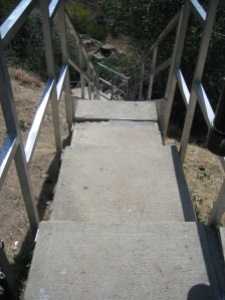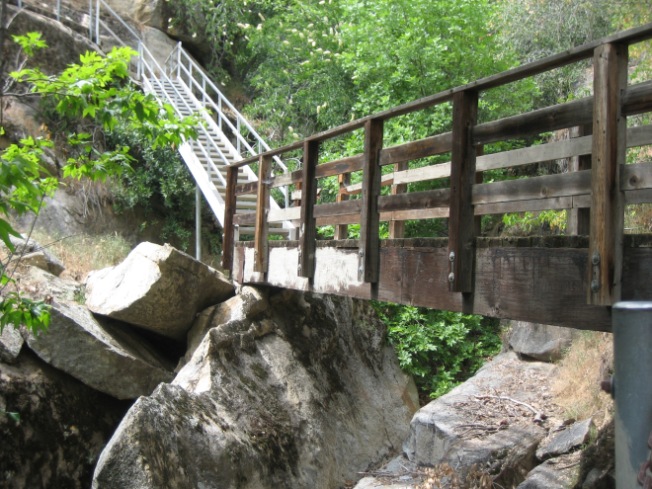 Let’s face it: a lot of us boondockers are city kids who’ve found ourselves spending a lot of time in the woods now that we’re living in our vans (or motorhomes or truck campers or cars or whatever). The forest can be a worrisome place for folks who didn’t camp much during our formative years. While I don’t sit around worrying about treachery at every turn, I do believe in taking precautions to keep myself and my belongings safe. Sometimes it’s easy to let our guard down when we’re surrounded by the beauty of nature, but vigilance is important, especially for folks out on their own.
Let’s face it: a lot of us boondockers are city kids who’ve found ourselves spending a lot of time in the woods now that we’re living in our vans (or motorhomes or truck campers or cars or whatever). The forest can be a worrisome place for folks who didn’t camp much during our formative years. While I don’t sit around worrying about treachery at every turn, I do believe in taking precautions to keep myself and my belongings safe. Sometimes it’s easy to let our guard down when we’re surrounded by the beauty of nature, but vigilance is important, especially for folks out on their own.
Whether you’re camping in a tent or a motorhome or something in-between, you want to stay safe and healthy during your time in the forest. These tips can help you if you’re spending just a weekend out in the trees or moving from forest to forest while living nomadically.
#1 Don’t leave your belongings lying around. You may be honest, but your neighbors may not be. Whether you’re in a campground or boondocking in the wilderness, it’s a good idea to put valuables away when you leave your camp. If you’d be sad if an item were stolen or if you can’t afford to replace it, lock it up before you go.
If I’m camping somewhere for more than one night, I’ll often set up a tent to use as my storage shed. If I leave camp, I can easily stow my stove, propane tank, and tables in the tent. It’s quicker than packing everything into the van, and while it won’t stop a determined thief, it will slow down someone who can’t resist easy pickings.
#2 Don’t open your door to strangers. Just because you’re out of the city doesn’t mean you shouldn’t be cautious about who you let into your living space. If a stranger knocks, talk through a window. While I believe most people in the world are good at heart, don’t let a bad apple into your rig by mistake.
#3 Make sure your campfire is dead out when you don’t want to supervise it anymore. Going on a hike? The fire  needs to be dead out. Going to bed? The fire needs to be dead out.
needs to be dead out. Going to bed? The fire needs to be dead out.
If you set the forest on fire, your safety is at stake too. If you’re away from your campsite or asleep when your campfire starts a wildfire, your property and life will be in danger.
The Forest Service gives these tips for making sure your campfire is completely out:
- First, drown the campfire with water!
- Next, mix the ashes and embers with soil.
- Stir the embers after they are covered with water and make sure that everything is wet.
- Feel the coals, embers, and any partially-burned wood with your hands. Everything (including the rock fire ring) should be cool to the touch. Feel under the rocks to make sure [there are] no embers underneath.
- When you think you are done, take an extra minute and add more water.
- Finally, check the entire campsite for possible sparks or embers, because it only takes one to start a forest fire.
- Remember…if it is too hot to touch, it is too hot to leave.
#4 Keep your pet leashed and under your control or in your rig. If coyotes are in the area, small dogs and cats are at risk of being snatched. If you’re in bear country, even a large dog is no match for an adult Ursus americanus (black bear), much less an Ursus arctos (grizzly bear). Dogs antagonize bears and bears attack dogs. Protect your dog by not letting it run loose.
 #5 Speaking of bears, don’t attract them with food and garbage left around your campsite. Keep a clean camp. Food and garbage lying around can attract not just bears, but other critters like flies, rodents, raccoons, and ravens. Of course, you don’t want to tangle with bears, but even smaller animals can create a huge mess by dragging food and garbage all over your campsite. Flies carry disease, and no one wants to get sick while they’re supposed to be enjoying trees and birdsong.
#5 Speaking of bears, don’t attract them with food and garbage left around your campsite. Keep a clean camp. Food and garbage lying around can attract not just bears, but other critters like flies, rodents, raccoons, and ravens. Of course, you don’t want to tangle with bears, but even smaller animals can create a huge mess by dragging food and garbage all over your campsite. Flies carry disease, and no one wants to get sick while they’re supposed to be enjoying trees and birdsong.
If you’re in a campground, put trash in garbage cans or dumpsters right away. Be sure you close garbage containers securely. If you’re boondocking in a place with no trash containers, tie garbage bags and stow them securely in your rig until you can pack out what you’ve packed in.
If bears are a problem where you’re camping, store all food and trash in bear boxes if provided or use your own bear canister.
#6 Beware of falling branches. It’s nice to park in a shady spot when the summer sun is beating down, but a falling branch can wreak havoc on your rig or tent. Look up before you pick your spot and notice any obviously dangerous tree limbs. Even if no limbs seem to be in danger of falling, remember that a high wind can send branches crashing to the ground with no warning.
A Forest Service website gives tips to keep you and your belongings safe from falling branches. Read all about it before you head off into the woods.
#7 Don’t pick up critters. The forest where I work seasonally posts warnings about plague and hanta virus.  Picking up a sick animal greatly increases one’s chance of infection. In most wild places, wild animals won’t let humans get anywhere near them. If a cute little critter lets you pick it up, it’s probably not healthy. Don’t risk your well-being by picking up a creature that might be infectious.
Picking up a sick animal greatly increases one’s chance of infection. In most wild places, wild animals won’t let humans get anywhere near them. If a cute little critter lets you pick it up, it’s probably not healthy. Don’t risk your well-being by picking up a creature that might be infectious.
#8 Watch out for snakes. While most snakes aren’t poisonous, you still don’t want to be bitten by one. Even a nonpoisonous snake bite may require medical attention. When a friend of mine was bitten by a rattler in his own driveway, he ended up spending a couple of nights in the hospital. I certainly don’t have the time or money for anything like that.
For a comprehensive guide to keeping your space free of snakes, see the great article “How to Keep Snakes Away from Your Campsite” on the TakeOutdoors website.
#9 Wash your hands. E. coli doesn’t take a vacation just because you’ve left civilization. If, like me, you don’t have running water in your rig, you can set up a handwashing station in your camp. I use a seven gallon water jug with a spigot so I can control the flow of water and conserve the precious resource. At a bare minimum, wash up after performing elimination functions and before handling food.
#10 Know what creepy crawlies and flying critters you need to protect against. In certain areas, bug bites can be more than a temporary annoyance. Do the local mosquitoes carry the West Nile Virus? Are you at risk from getting Lyme disease from the ticks where you’re camping? Do you need to worry about brown recluse or black widow spiders? If the pests where you’re camping are poisonous or carry disease, you’re going to have to be extra vigilant about protecting yourself.
 Ticks are creepy whether or not they carry Lyme disease. If you find an attached tick during a full-body inspection, you’ll want to remove it immediately. Go to the Centers for Disease Control website to learn the steps for removing a tick. You may want to print out the steps to include in your first aid kit.
Ticks are creepy whether or not they carry Lyme disease. If you find an attached tick during a full-body inspection, you’ll want to remove it immediately. Go to the Centers for Disease Control website to learn the steps for removing a tick. You may want to print out the steps to include in your first aid kit.
The Mobile RVing website has a good article on “How to Control Mosquitoes at Your Campsite.”
The Pronto Pest Management offers “10 Tips to Protect Yourself from Ticks While Camping.”
The USA Today website has an article with tips on “How to Keep Spiders from Campsites.”
There’s no way to imagine or prepare for every single danger one might encounter in the woods. In life we run into situations that could lead to harm, whether we’re in the city or the wilderness. I hope these tips help you plan for your health and safety when you leave the concrete and venture out into nature.
Remember, Blaize Sun can’t prepare you or protect you from every danger you might encounter in the forest. You are responsible for our own self. Research the problems you might encounter in the area you plan to camp in before you get there. Call the local BLM field office or Forest Service ranger station responsible for the place you want to camp and ask about hazards in the area. Think before you act. If something you’re about to do seems potentially dangerous, don’t do it!










